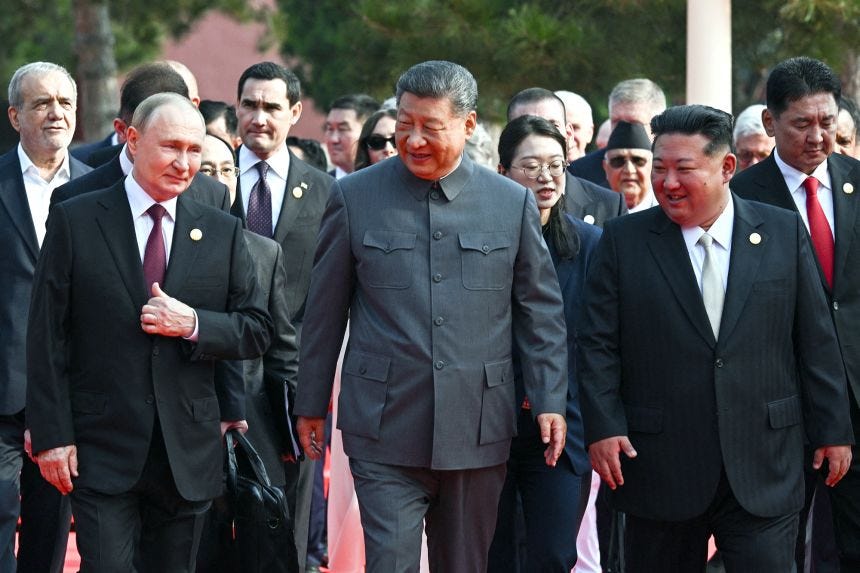Asia Communique — September 28
Xi Demands Stronger U.S. Language Opposing Taiwan Independence — WSJ | U.S. Clears South Korea of Currency Manipulation Allegations | Russia’s Quiet Role in China’s Taiwan Plans |
Hello Readers,
Today, we dive into how Russia is assisting China in its plans to invade Taiwan. We also examine an exclusive report by The Wall Street Journal, which states that Chinese President Xi Jinping is seeking to push Washington to openly oppose Taiwan’s independence. Let’s get straight into it.
Russia’s Quiet Role in China’s Taiwan Plans
Leaked documents reviewed by the Royal United Services Institute (RUSI) and Western media outlets suggest Russia has agreed to train and equip Chinese paratroopers for a potential Taiwan invasion. The revelations highlight how far Moscow and Beijing have expanded their defense partnership beyond public declarations.
The Leaks
A hacktivist group called Black Moon reportedly obtained an 800-page cache of Russian–Chinese defense agreements. Now, this is a very fascinating leak that was brought to light by RUSI. Here is the social media account of Hacktivist group, BlackMoon: https://x.com/blackmoon_group.
The documents detail China’s purchase of 37 BMD-4M light amphibious vehicles, 11 Sprut-SDM1 self-propelled anti-tank guns, and 11 BTR-MDM airborne armored personnel carriers from Russia, along with parachute systems designed for heavy airdrops. The contract, valued at $584 million, also commits Moscow to providing full technical documentation and compatibility upgrades with Chinese systems.
Negotiation records show Beijing pressing for accelerated delivery schedules and insisting that Moscow establish a maintenance hub inside China. The deal was reportedly finalized in October 2024.
Strategic Rationale
RUSI’s analysis emphasizes that amphibious landings on Taiwan’s beaches are fraught with risk given the island’s geography. By strengthening its airborne assault capacity, the People’s Liberation Army (PLA) is hedging against the failure of a traditional amphibious operation. Capturing and holding airfields could enable China to airlift forces directly onto Taiwan, though this approach faces its own vulnerabilities—as Russia learned in Ukraine.
Jack Watling of RUSI notes that “the Russians have become an enabler for the Chinese,” making the two militaries increasingly integrated in doctrine and practice.
Wider Cooperation
The documents also reveal that Chinese officers attended Zapad-2025, Russia’s joint war games with Belarus, where Moscow demonstrated the high-altitude airdrop tactics now of interest to Beijing. In 2024 alone, Russia and China conducted 14 joint military exercises, nearly double the number from a decade ago.
Moscow’s defense industry and energy exports are described by analysts as a potential “strategic backup” for Beijing, especially if U.S.-led sanctions escalate.
Taiwan’s View
A Taiwanese security official told The Washington Post that “military cooperation between China and Russia goes far beyond what has been publicly acknowledged.” Taipei sees the documents as further proof that Xi Jinping’s 2027 readiness directive is reshaping the PLA’s operational planning, with Russian expertise filling critical gaps.
U.S. Clears South Korea of Currency Manipulation Allegations
The United States has agreed that South Korea is not manipulating its currency for trade advantage, according to a statement from President Lee Jae Myung’s office on Sunday. Seoul will not be included under Washington’s formal “currency manipulator” designation, which the U.S. Treasury reviews twice a year.
A spokesperson, Kang Yu-jung, made the announcement at a press conference, noting that the decision removes a source of tension in bilateral economic relations. U.S. embassy officials in Seoul could not be reached for comment outside business hours.
The move marks a reversal from past U.S. positions. The Biden administration placed South Korea on a monitoring list in November, citing the country’s current account and bilateral trade surpluses. The Trump administration also kept Seoul on the list earlier this year. Under a 2015 U.S. law, Washington reserves the right to impose “remedial action” on countries found undervaluing their currency for trade benefit.
South Korean officials stressed that this agreement is separate from ongoing talks over a foreign exchange swap and tariff negotiations with Washington. President Lee has linked the swap to Seoul’s ability to fulfill its pledged $350 billion investment in the U.S. economy, a commitment tied to Trump’s tariff demands. Finance Minister Koo Yun-cheol said Lee raised the issue directly with Treasury Secretary Scott Bessent last week in New York, with Bessent promising to consult U.S. officials.
National Security Adviser Wi Sung-lac reiterated on Saturday that Seoul cannot pay the $350 billion “upfront,” as Trump has recently suggested. Lee also warned in an interview with Reuters that accepting U.S. demands without safeguards could trigger an economic crisis comparable to the 1997 Asian financial meltdown.
Meanwhile, reports surfaced in the Wall Street Journal that Commerce Secretary Howard Lutnick discussed raising the $350 billion investment, though Koo said he had not received confirmation of such discussions.
Xi Pushes U.S. for Harder Line on Taiwan
Chinese President Xi Jinping is pressing Washington to sharpen its language on Taiwan, urging the United States to move from saying it “does not support” Taiwanese independence to explicitly stating that it “opposes” it, according to the Wall Street Journal. The distinction may sound semantic, but for Beijing it would be a diplomatic coup—narrowing Taipei’s room for maneuver and signaling U.S. alignment with China’s position.
Xi intends to raise the issue in upcoming talks with President Trump, calculating that Trump’s appetite for a broader China deal could make Washington more pliable. U.S. officials, however, have resisted such a shift, warning that it would weaken America’s carefully calibrated ambiguity and erode confidence in its commitments to Taiwan. The Biden administration had already set a baseline by stating it “does not support independence” while opposing unilateral changes to the status quo.
For Xi, securing this concession would be a symbolic victory in the battle of narratives over Taiwan’s future. For Washington, the risk is that even a minor change in wording could reverberate across regional security dynamics—raising doubts in Taipei, emboldening Beijing, and unsettling allies who depend on U.S. credibility to balance Chinese power.
That’s a wrap. See you next time!


